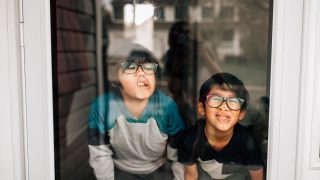
We are currently living through a pandemic the likes of which the world hasn’t seen in over 100 years. At Grace Psychological Services, we have seen an increase in reported anxiety and depression symptoms since the quarantine was put in place in March. It’s been a tough time for adults and also for children. When you throw autism in the mix, things can get quite hairy, quite fast. For starters, people with autism tend to like routine. Change can be hard for all of us, but some autistics really need routine and the closure of school buildings for the remainder of the school year was an abrupt and mysterious change to their daily routine. This abrupt change may have resulted in increased temper tantrums at home, withdrawal, regression in behavior, or changes in sleeping and eating patterns.
Autistics struggle with social interaction, but this does not mean that they do not crave social interaction. The mandates to stay home removed their ability to interact socially with peers. For those who were suffering bullying at school, staying at home might not have seemed like such a bad idea for a while. For others whose main source of peer interaction were their classmates, or their teammates, staying at home has been very hard. Parents may have noticed their child demanding increased screen time, or an increase or decrease in their child’s activity level.
Scientists are encouraging people to wear face coverings in an effort to curb the spread of COVID-19. Many individuals with autism have sensory processing differences that result in increased hypo- or hypersensitivity to environmental stimuli including auditory, tactile, or visual input. Wearing a mask and other personal protective equipment (PPE) may be difficult for individuals with hypersensitivity to tactile input.
Times are tough. Here are some tips for helping autistic children through this pandemic.
Create and Keep a Routine
With your child’s input, write out a daily schedule, post it somewhere visible to your child, and follow it. Younger children may benefit from photos of the scheduled activities. Older children can type out the schedule themselves to increase buy-in. Make sure to include activities that are enjoyable to your child and to schedule those after activities that they may not find as enjoyable, such as exercise or doing chores. For those children that avoid exercise, a walk with Mom or Dad, while chatting about the child’s favorite topics, is a great way to burn those calories.
Make Time for Peer Socialization
Peer socialization is very important to kids’ mental health. You can reach out to the parents of your child’s friends and schedule time for socialization. Schedule family play time. Find a virtual meet-up or social skills group. Encourage your child to play outside in the earlier or later part of the day to avoid the heat.
Prepare for Wearing Personal Protective Equipment
We can’t always avoid going out with the kids and these days that means wearing a mask. To teach your child to wear a mask, it helps to start by communicating with them the importance of wearing a mask. Social stories are a good social learning tool that can help with this. Practice wearing a mask at home before your child will need to wear it in public. Pair the mask with a positive outcome. Electronics are often highly rewarding for kids. It is okay if your child is allowed to play on the tablet as a reward for wearing their mask, but make sure that you have other rewards handy as well. Do limit screen time to no more than 30-45 minutes at a time.
Take Care of Yourself
There is a myth that autistic people are not empathetic, but I find that that is rarely the case. Your autistic child may be even more in tune with you than your neurotypical child. If you are anxious and depressed, your child is likely to feel that, too. Self-care is important for our mental health. Schedule time for relaxation, whether that be taking a long shower, reading a good book, or watching your favorite show, without any mom guilt! After all, to the world you are a mother, but to your family, you are the world.
Do you have a tip to share that has worked for your family during the pandemic? I’d love to hear from you!
Resources
https://www.spectrumsenseformoms.com/2019/01/07/how-to-make-a-visual-schedule-for-autism/
https://www.autismnj.org/article/helping-individuals-with-autism-wear-face-masks/


 Dr. Gracie Reyes-McDonald is a bilingual (English/Spanish) Licensed Psychologist and Licensed Specialist in School Psychology with extensive training and experience in the assessment and treatment of children/adolescents of diverse backgrounds. She majored in Psychology at Baylor University, earned her Master of Arts in School Psychology from the University of Houston-Clear Lake, and earned her doctorate in School Psychology from the University of Houston, where she completed research on the reading development of Spanish-speaking English language learners. She has over 17 years of experience working in public schools, with additional training experiences completed at the Meyer Center for Developmental Pediatrics at Texas Children’s Hospital and the Mental Health and Mental Retardation Authority (MHMRA) of Harris County, where she gained additional training and experience in testing and working with autistic children and adults.
Dr. Gracie Reyes-McDonald is a bilingual (English/Spanish) Licensed Psychologist and Licensed Specialist in School Psychology with extensive training and experience in the assessment and treatment of children/adolescents of diverse backgrounds. She majored in Psychology at Baylor University, earned her Master of Arts in School Psychology from the University of Houston-Clear Lake, and earned her doctorate in School Psychology from the University of Houston, where she completed research on the reading development of Spanish-speaking English language learners. She has over 17 years of experience working in public schools, with additional training experiences completed at the Meyer Center for Developmental Pediatrics at Texas Children’s Hospital and the Mental Health and Mental Retardation Authority (MHMRA) of Harris County, where she gained additional training and experience in testing and working with autistic children and adults.